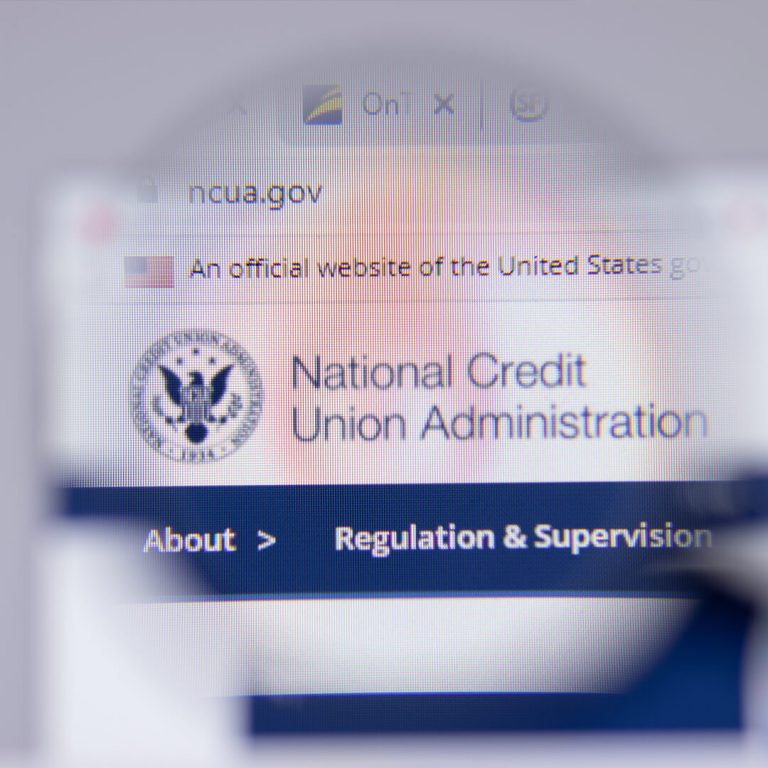Most people have heard enough about the Federal Deposit Insurance Corporation (FDIC) to know that it insures deposits at banks in savings vehicles like checking and savings accounts up to $250,000. But if you have money in similar accounts at any federal credit union or most state credit unions, you should be as familiar with the National Credit Union Administration (NCUA) and its role in protecting your money.
The same is true if you’re thinking about opening an account at a credit union, which operates differently than a bank even though it offers similar deposit and loan products. Credit unions are not-for-profit financial institutions owned by their members—the people and businesses who have accounts with them. As MyCreditUnion.gov explains, “profits made by credit unions are returned back to members in the form of reduced fees, higher savings rates and lower loan rates.”
What is the NCUA?
Like the FDIC, the NCUA is an independent agency of the federal government that is part of a formal interagency body called the Federal Financial Institutions Examination Council (FFIEC). The other members of the FFIEC include the Federal Reserve Board (FRB), the Office of the Comptroller of the Currency (OCC) and the Consumer Financial Protection Bureau (CFPB).
The member agencies of the FFIEC help ensure the stability of the U.S. financial system by collectively creating and promoting uniform standards while individually fulfilling their specific missions. Created in 1970, the NCUA’s job is to oversee federal credit unions and manage the National Credit Union Insurance Fund (NCUSIF), which protects credit union member deposits.
A three-member board of directors leads the NCUA. Candidates for open director seats are appointed by the President of the United States and approved by the Senate. To maintain its nonpartisan role, the three board members can’t all belong to the same political party and their six-year terms are staggered to potentially overlap with different presidential administrations.
What does the NCUA do?
The NCUA has four primary responsibilities:
- Chartering: Credit unions need a license, or charter, to operate, and the NCUA administers the application process and issues charters for approved federal credit unions. Alternatively, prospective credit unions can apply to a state regulator for a state-issued charter.
- Insuring: One of the most important jobs of the NCUA is running the NCUSIF. Backed by the full faith and credit of the U.S. government, this fund provides insurance coverage for all federal credit unions and for state credit unions that apply for it.
- Supervising: The administration ensures the safety and soundness of all federal credit unions and every state credit union insured through the NCUSIF. It does this by identifying and monitoring their risks through routine examinations.
- Regulating: The NCUA also has the power to write new or updated rules and regulations to which credit unions must comply.
How much of your money is insured through the NCUSIF?
It’s rare for an NCUA-insured credit union to fail. But if it did, the NCUSIF would cover up to $250,000 of the total of each member’s individually owned deposits in the following:
- Checking accounts
- Savings accounts
- Money market accounts
- Term accounts (similar to certificates of deposit, or CDs)
The NCUSIF would also cover another $250,000 for each member’s total share of jointly owned deposits in those same account types. Moreover, if you have deposits at more than one NCUA-insured credit union, you’re eligible for that same amount of coverage at each one.
This example of a couple with a significant net worth helps demonstrate these coverage limits:
- At credit union A, Sally has a checking account with $25,000, a money market account with $30,000 and a savings account with $200,000 for total deposits of $255,000. All but $5,000 of her individually owned deposits would be fully insured.
- Sally’s husband John has individual deposits at two credit unions. At credit union A, he has $250,000 that is split between his checking, savings and term accounts. At credit union B, he has another $50,000 in a saving account. Both are fully insured because neither exceeds the $250,000 per credit union aggregate limit for these types of accounts.
- Jointly, Sally and John have $500,000 in another savings account at Credit Union A. Because each account holder of a joint account is also insured up to $250,000, they’re entire joint savings account is fully covered.
Credit union members are also eligible for separate coverage in each of the following categories if they meet the regulated requirements, which a trust department professional can explain to you:
- Retirement accounts including KEOGH accounts and traditional and Roth IRAs
- Revocable trusts
- Irrevocable trusts, which include Coverdell Education Saving Accounts (529 Accounts)
There are other products that your credit union may offer that aren’t covered by the NCUA’s insurance fund. They include the following:
- Mutual funds
- Stocks
- Bonds
- Insurance policies
- Annuities
For help determining your specific coverage, visit MyCreditUnion.gov/estimator.
Look for the NCUSIF sign
Credit unions that are NCUA-insured must display a NCUSIF sign that reads, “Your savings federally insured to at least $250,000 and backed by the full faith and credit of the United States Government.”
When you see that message, you know your money is safe.
Editor’s note: Quorum is not affiliated with any of the companies mentioned in this article and derives no benefit from these businesses for placement in this article.






Comments Section
Please note: Comments are not monitored for member servicing inquiries and will not be published. If you have a question or comment about a Quorum product or account, please visit quorumfcu.org to submit a query with our Member Service Team. Thank you.